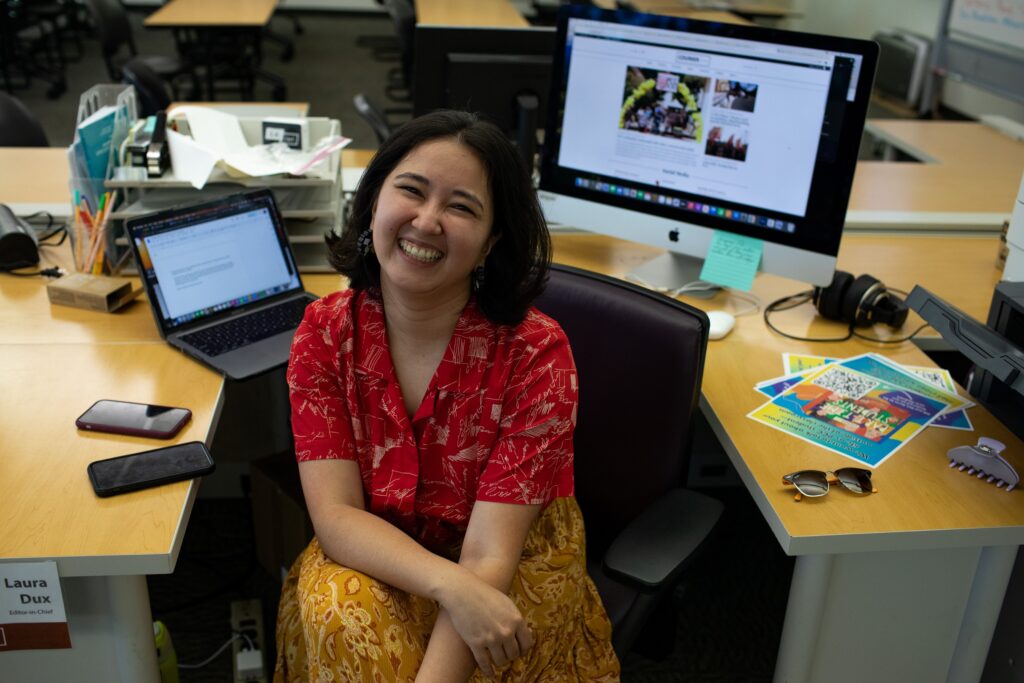When I decided to enroll in community college, my goal wasn’t to get a degree — I wanted a new job.
I have my bachelor’s degree in acting and was a professional actor until the pandemic. At 25, I was happy with my life as an actor. My calendar was even booked out for the entire year, performing in theaters across the state of Washington.
A week before I was laid off from a theater contract, I saw a video of NPR host Korva Coleman reading the hourly headlines. I watched her effortlessly move through the segment as she held her script and pressed play on audio clips, while simultaneously keeping herself to time. It felt like watching live theater for the first time.
“I wish I could do that,” I thought.
I never got another acting contract after the pandemic, and all of a sudden, I was 28. My acting resume suddenly looked useless to me and my other resume was just a list of odd jobs I did to support myself as an actor.
My plan before the pandemic was to move to Los Angeles to further my career. I still made the move even though I let acting go. The only thing I still had in common with my previous life was my commute to work as a waitress — listening to the news. I thought about Korva Coleman operating a radio board.
I wasn’t alone in having an existential career change crisis at this time. In 2021, a U.S. Catalyst/CNBC poll said that 50% of employees wanted to make a career change because of the pandemic. I spent my days off looking at job postings for my local NPR affiliate stations that I wasn’t qualified for. I would get frustrated that I couldn’t intern because I wasn’t a student.
That’s when I decided to enroll at Pasadena City College. I started last spring with the goal of landing an internship — being a student was just a title to qualify.
Everything I did during my first semester was strategic. I picked Pasadena Community College because it offered internships directly with LAist (formerly KPCC), a non-profit newsroom. I enrolled only in classes that would give me resume-building skills and certificates. By the end of my first semester, with only a couple completed courses, I networked my way to landing the internship position at LAist.
This past summer marked the end of my yearlong internship and, through no fault of my own, I do not have a job.
It still takes all my willpower not to count this as a defeat.
I told myself the title of student was just a qualifier for the internship, but I still made sure I got straight A’s. I took on leadership positions at the school newspaper while I was doing my office work for LAist in class. Anytime I wasn’t at school or at my internship, I was working as a server at a restaurant to pay my bills.
More than 65% of community college students are working more than part-time, according to recent research. And, according to a survey by the RP Group, a nonprofit research center affiliated with the California community colleges, one-third of would-be returning community college students haven’t re-enrolled because they’ve prioritized work.
After this year, I wasn’t planning on enrolling back in school for the fall. But then my journalism professor approached me to be editor-in-chief for the campus newspaper, The Courier. I didn’t respond to him for weeks because I was still in the mindset that my return to college was strictly for the career. Being a student doesn’t pay for my rent, gas and food.
When I was a student in my undergraduate theater program, a professor told me that you should only take an acting job if it meets two of three requirements:
- It is a paid job and it pays well,
- It offers an opportunity to network and grow as an actor,
- And/or it is a dream role.
In other words, should an opportunity only fulfill one of these requirements, don’t bother with it. However, you should not expect every opportunity in your life to meet all three points. Those are few and far between.
I thought about her advice a lot when I returned to college at PCC. Taking the role of editor-in-chief barely makes two out of the three requirements — but then I remembered that this list was to help you with taking jobs in your career, not for being a student.
Being the editor-in-chief this semester has allowed me to push myself to be a better reporter, a stronger editor and a peer to turn to if a student needs help. I get weekly joy from reading work from my classmates who chose to show up simply because they want to learn.
For the first time in this academic journey to change careers, I have found myself at peace being a student learning in a classroom. While I’m still anxious about the unknown, I’m allowing myself to appreciate that I made the first step on this long journey towards a new career.
•••
Laura Dux is a second-year journalism and radio broadcast major at Pasadena City College and editor-in-chief of the student-run newspaper, The Courier. She is a member of EdSource’s California Student Journalism Corps.
The opinions expressed in this commentary represent those of the author. EdSource welcomes commentaries representing diverse points of view. If you would like to submit a commentary, please review our guidelines and contact us.

